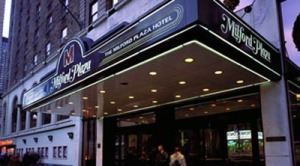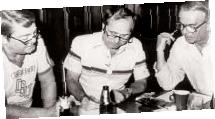I love fantasy sports, particularly fantasy baseball and football. On Wednesday morning this week, I claimed three fantasy football championships on Yahoo! sports. I was a bit disappointed as most of my teams had gotten destroyed in the semifinals the week before. I limped into the finals with only 6 of my original 16 teams left alive. As a historian, I have always known how fantasy baseball started, but I never knew how fantasy football did. So, I did some digging this morning and it turns out fantasy football has been around a lot longer than the “Rotisserie” of Fantasy Baseball.

I started playing fantasy football at Maggie’s Tavern in Litchfield, Illinois in 1990. It was a simple league. If your player scored, you got six points. The draft was conducted in a backroom of cigarettes, cigars, and beer. The origins of fantasy football are not that different.
It begins in the Manhattan Hotel (now the Milford Plaza Hotel) in New York City. Wilfred “Bill” Winkenbach, a limited partner in the Oakland Raiders and businessman, along with Raiders Public Relations man Bill Tunnel and Oakland Tribune reporter Scotty Starling developed the rules and groundwork of what would become the first fantasy football league. The league would consist of eight teams. In addition to Winkenbach, Tunnel, and Starling, the other teams were owned by Bob Blum (Raiders play-by-play announcer), Phil Carmona (Raiders season ticket seller), Ralph Casebolt (Raiders season ticket seller), George Glace (Raiders ticket manager) and George Ross (Oakland Tribune sports editor).
The original rules state:
“Inasmuch as this test of skill and knowledge of the players in the AFL and NFL leagues will be backed by coin of the realm, it behooves each club owner to study carefully prior to draft, all available statistics, schedules, weather conditions, player habits and other factors, so as to preserve one’s prestige and finances.”
Wiknebach called the league the “Greater Oakland Professional Pigskin Prognosticators League” or GOPPPL . The league made its debut in 1963. The purpose of the league was…
“To bring together some of Oakland’s finest Saturday morning gridiron forecasters to pit their respective brains (and cash) against each other. Inasmuch as this league is formed only with owners having a deep interest and affection for the Oakland Raiders Professional Football Team, it is felt that this tournament will automatically increase closer coverage of daily happenings in professional football.”
This league was quite different as it combined both the AFL and the NFL. Back in the 1960s, the AFL was much more offense oriented than its NFL brethren. In addition to a winner, there was also a loser. Whoever came in last place had to keep a “dunce trophy” on their mantle until the next year. The original league drafted 20 players from either league. They consisted of
4 WRs
4 HBs
2 FBs
2 QB
2 Return men
2 Ks
2 DBs/LBs
2 DE
The original scoring system had 25 points for a touchdown pass, run, or catch, 25 points for a field goal, 10 points for a PAT, and 200 points for a defense or special teams score. George Blanda was the first player ever selected. Winkenbach served dutifully as the commissioner. Having mimeograph machine made him the obvious choice to print up the reports each week. For almost fifty years now, the league has continued. Some of the original players have moved on, some have died, and some continue to play.

In the years since the founding of fantasy football, the trend and the sport have exploded. This past year, the NFL saw its highest TV ratings ever. I, for one, sit on the couch or in my lounge chair, with a laptop checking scores and stats, while I watch the Bears games and other games involving my players. Founder Scotty Starling said:
“We had no idea it would explode into the kind of mania that exists today. Pro football isn’t a game. It’s a cult. And [Fantasy Football] is close to a cult.”
And it is huge! The NFL even talks about fantasy football openly and encourages the fun by sponsoring its own leagues and joining with corporations to play it on phones (This year it is Sprint). Men play. Women play. My junior high students play. You can play for money, or not play for the fun of it. It is irritating, it is joyful, it is revenge on the those who run the actual teams. The joy of fantasy football is anyone could put together a team of players and win. Since the arrival of the Internet, fantasy football has exploded into Americana. There are dozens of ways to play and different types of leagues. It all adds to the fun of the community of football and Sunday afternoons.
Source Information
How Stuff Works PDF File

[…] if you are really desperate to test out your football knowledge, you can always set up a fantasy team and see how many points you get at the end of the season. […]